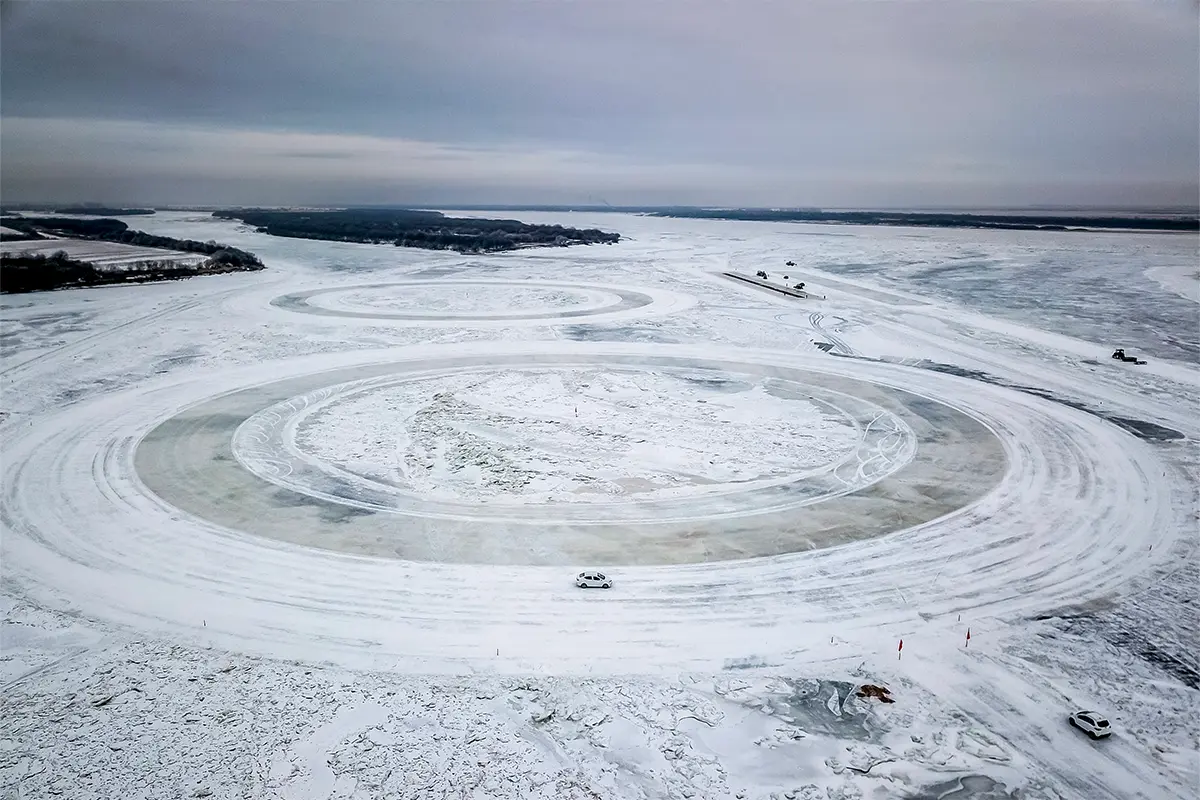The Japan Meteorological Agency: the city of Mohe close to the Russian border, recorded its lowest temperature, minus 53 degrees Celsius, on January 2023
The increase in greenhouse gas emissions has caused global warming, and the climate crisis humans have been faced with in the past few decades. Climate change is associated with an increase in extreme weather events such as prolonged droughts and heat waves.
Because of the warming in the Arctic caused by climate change, the incidence of cold waves in Eurasia’s mid to high latitudes is changing.
Waves of extreme cold weather like the one that hit east Asian countries such as Japan, China, and South Korea do not happen in a vacuum but show the impact that the effects of climate change on the Arctic can have on the rest of the globe.
Extreme cold weather hit East-Asian countries in the winter of 2023
Exceptional cold weather hit East-Asia in January 2023. According to the Japan Meteorological Society, the East-Asian country experienced the lowest temperature ever recorded in the month of January, on January 27, 2023: minus twenty-four-point-nine degrees Celsius.
According to the Japan Meteorological Agency, on January 24, 2023, thirty-one centimeters of snow was observed in Tsuyama and twenty-eight centimeters in Mimasaka City. On the 25th, the lowest temperature was below freezing all over the country except for the Nansei Islands.
The northernmost city in China, Mohe in the Heilongjiang province close to the Russian border, recorded its lowest temperature, minus fifty-three degrees celsius, on Sunday, January 22, 2023.
According to the Korea Meteorological Administration (KMA), on January 25, 2023 morning in Seoul, South Korea’s capital city, the temperature reached minus nineteen-point-three degrees Celcius while the effective temperature was about minus twenty-five-point-seven degrees Celsius. Due to the weather, flights to and from South Korea’s largest island, Jeju, have been canceled.
The Japan Meteorological Agency
The Japan Meteorological Agency (JMA) was founded in 1875, when its predecessor, the Tokyo Meteorological Observatory (TMO), was established. This agency of the Japanese Ministry of Land, Infrastructure, Transport, and Tourism provides the prediction and monitoring of natural events.
The Japan Meteorological Agency uses data from the Himawari geostationary meteorological satellites, twenty Doppler weather radars, radiosonde stations, wind profiler stations, and 160 weather stations to monitor atmospheric phenomena. In addition, the agency monitors global environmental phenomena such as oceanographic conditions, greenhouse gases, and solar radiation.

The region’s climate – is extreme cold weather frequent in these areas?
January is the coldest month in Korea, with temperatures ranging from minus six to seven degrees (Korea Meteorological Administration). Japan experiences cold weather in its winters. Snowfall in the part of the country facing the Sea of Japan and in the mountainous area is heavy (Japan Meteorological Agency). China is a large country, the majority of which is affected by the Asiatic monsoon in winter (Met office).
The region is not new to extreme cold weather. North China was hit by severe cold weather in the 2020 and 2021 winter, with record low temperatures in Northern Chinese cities (Zheng, Yuan, Ding, Li, Fang, Zhao, Sun, Zhu, Ke, Wang, et al. 2021).
In late December 2020, a cold air outbroke swept across East Asia from Siberia, bringing record-breaking cold surface air temperatures to the region along with related damages. (Yang and Fan, 2022).
Cold air masses tend to hit the regions of East Asia in the boreal winter months. A temperature drop characterizes these cold surges (CSs), brought down south by winds from areas further up north: the polar region, the country of Mongolia, and the Eastern-Russian region of Siberia. This movement of cold air from higher-latitude areas down south and east in East Asia is referred to as the East Asian winter monsoon (EAWM).
The EAWM is influenced by climate change, given the relationship between the EAWM and land-sea thermal contrast (Hsu et al., 2013; Ding et al., 2014).
The relationship between climate change and extreme cold weather – part of a broader pattern
Extreme cold events in East Asia have become more regular with the accelerating warming happening in the Arctic (Shepherd, 2016). The relationship between Eurasian and Arctic surface air temperature in the winters of the Northern Hemisphere is defined by the warm Arctic and cold Eurasia (WACE) pattern.
As global average temperatures are increasing because of anthropogenic greenhouse gas (GHG) emissions, this increase is affecting the Arctic in a singular fashion. The rise of temperatures is happening faster over the Arctic region than in other regions, in a phenomenon called Arctic amplification.
The difference in warming speed between the Arctic and the other regions of the globe has been significant in the past few decades. According to a 2022 study by researchers from the Finnish Meteorological Institute, in the years between 1979 and 2021, the Arctic warmed about four times faster than the rest of the planet (Rantanen, Karpechko, Lipponen. et al. 2022).
Faculty of Environmental Earth Science of Hokkaido University
Arctic warming could be affecting winter weather in mid-latitude regions, bringing about extreme cold weather events. This phenomenon is due to the impact of this warming on the Arctic region, which is experiencing melting glaciers, sea ice, and polar ice caps. Among the consequences of this melting is the alternation of the regional hydrological cycle due to enhanced evaporation.
A 2022 study conducted by researchers from the Faculty of Environmental Earth Science of Hokkaido University, Japan Meteorological Agency, Mie University, and Nagoya University analyzed the impact of an altered regional hydrological cycle in the Arctic on snowfall in western Russia. They found that enhanced Arctic moisture transport toward Siberia corresponded with substantial Arctic sea ice retreat and increased snow cover in the western Russian region.
The consequences of extreme cold weather on human societies
In recent years, the world has seen an increase in the frequency of extreme cold events. (Dai et al., 2021; Yin and Sun, 2018). An increase in the frequency of extreme cold events can have socio economic ramifications. These negative temperature anomalies can impact societies through the strain they inflict on the economy, agriculture, infrastructure, human health, and transportation.
A study conducted by researchers from ten different colleges and institutions across east Asia, Europe, and North America investigated how Arctic warming has been affecting East Asian terrestrial ecosystems with the help of earth system modeling, local observations, an index of sea surface temperatures from the Barents-Kara Sea, and satellite data.
They found a negative relationship between the Arctic Temperature (ART) index and crop yields like cereals, fruits, root vegetables, nuts, and pulses in East Asia and estimated the impact of the extreme cold weather fueled by higher-than-average Arctic temperatures on carbon uptake capacity.
Power demand surge and vegetation damage
«The cooler winters also reduce agricultural productivity of cereals, fruits, root vegetables, and legumes». Explained the first author Jin-Soo Kim of the Department of Evolutionary Biology and Environmental Studies at the University of Zurich, in a statement.
«This study highlights how complex the effects of climate change are. While we observe strong warming in the Arctic system, especially over the Barents-Kara Sea, we have now discovered that this warming affects ecosystems thousands of kilometers away and over multiple weeks through climate teleconnections. Arctic warming is not only threatening the polar bear, but will affect us in many other ways». said Gabriela Schaepman-Strub, co-author of the study.
The Green Energy Strategy Institute of South Korea and the Korea Energy Agency
These extreme cold weather events can affect power demand. A 2019 study conducted by researchers from the Green Energy Strategy Institute of South Korea and the Korea Energy Agency looked at the trends of extreme cold weather events in the central regions of Korea and their effect on the region’s heating energy demand.
The researchers found that in the area, between 2009 and 2015, the peak power demand occurred in the winter. In addition, they found that the extreme cold that hit the region in 2010 and 2013 coincided with a January heating energy consumption higher than the 1997 to 2015 average. This study’s researchers suggested that energy policymakers must consider the possibility of worsening extreme cold in the mid-term and establish policy measures for it, and strengthen energy welfare policies for low-income people.
The Japan Meteorological Agency
Agency of the Ministry of Land, Infrastructure, Transport and Tourism based in Minato City, Tokyo.



















